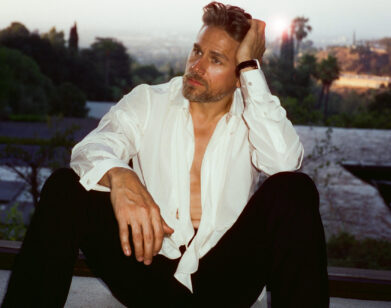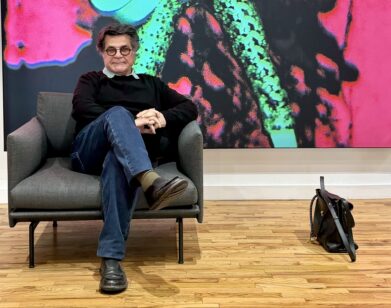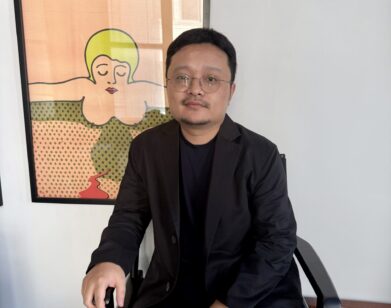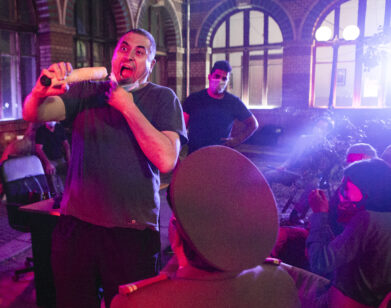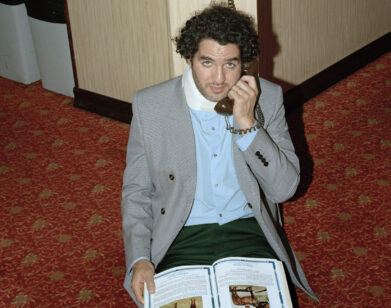New Again: Steve Buscemi
Cinema’s favorite impersonator of eccentrics and gangsters, Steve Buscemi, has a few new films in store, but his past roles never recede far from our mind. Whether as Donny in The Big Lebowski (1998), Mr. Pink in Reservoir Dogs (1992), or Nucky Thompson in Boardwalk Empire (2010–14), Buscemi’s take on characters is always memorable. Sadly, one of his early, lesser-known leading roles, as Adolpho Rollo in Alexandre Rockwell’s In the Soup (1992), may be left unseen by future audiences, because the film’s archival print no longer exists.
But there is hope: Factory 25, an independent distributing company, has launched a Kickstarter campaign to raise funds for the restoration and re-release of the Sundance Grand Jury Prize-winning, black-and-white comedy. In the campaign’s promotional video, Buscemi stars as your friendly neighbor telling strangers about In the Soup’s urgent need for restoration. In danger of disappearance is not only a character that paved the way for Buscemi’s later success, but delightful performances by Jennifer Beals, Seymour Cassel, and Sam Rockwell—plus a cameo by Jim Jarmusch.
As In the Soup awaits supporters, we reminisce about Buscemi’s other memorable performances and take a look at his interview from our October 1996 issue, in which the actor reveals his circuitous introduction to the profession of acting. —Zuzanna Czemier
Steve Buscemi
By Brooke Smith
With his skinny frame, bulging eyes, and varying styles—from dweebish to deadpan to deadly—Steve Buscemi has become one of the best and most beloved character actors around. Now, he’s taking his shots both behind and in front of the camera in this month’s Trees Lounge.
I met Steve Buscemi on the set of Robert Altman’s film Kansas City, in which we play husband and wife. What amazes me the most about Buscemi’s acting is the seamlessness of it. You never actually see him acting: You see a real person in each character he creates—someone you can relate to no matter what the circumstances. His list of credits is remarkable, as this sample demonstrates: Parting Glances (1986), Mystery Train (1989), New York Stories (1989), King of New York (1990), Miller’s Crossing (1990), Barton Fink (1991), In the Soup (1992), Reservoir Dogs (1992), The Hudsucker Proxy (1994), Pulp Fiction (1994), Living in Oblivion (1995), Desperado (1995), Things to Do in Denver When You’re Dead (1995), Fargo (1996), John Carpenter’s Escape From L.A. (1996), and Kansas City (1996).
This month, Buscemi makes his feature-film debut as a writer/director with the semi-autobiographical Trees Lounge, in which he plays Tommy Basilio, an unemployed Long Island auto mechanic and barfly going nowhere fast; it co-stars Carol Kane, Anthony LaPaglia, and Chloe Sevigny. I conducted this interview with Buscemi at his Brooklyn home.
BROOKE SMITH: So start by telling me your life story.
STEVE BUSCEMI: Aw, man! Not you, too. All right. Born in Brooklyn, grew up in Valley Stream, Long Island. It wasn’t until my senior year in high school that I started acting. After that, I went to Nassau Community College to do liberal arts but dropped out after a semester. I was going to buy a van and move to L.A. so I could secretly pursue acting without any of my friends knowing.
SMITH: Why, because it wasn’t cool?
BUSCEMI: I was just shy about it.
SMITH: So what happened to the van plan?
BUSCEMI: My father talked me out of it. He persuaded me to take acting classes in Manhattan instead and encouraged me to take the civil-service test for the fire department. I eventually moved to the Lower East Side and worked for a furniture-moving company while doing stand-up comedy in uptown clubs. After two years, I got called up for the New York City Fire Department—Engine Company 55 on Broome Street. It was a year before the other guys found out I did stand-up. This other fireman actor, Dean Tulipane, outed me. The guys were shocked that I did comedy.
SMITH: Why had you chosen stand-up?
BUSCEMI: Because my biggest aspiration was to get on a sitcom. I didn’t think I’d ever be able to do movies. That was for serious actors.
SMITH: What was your act like?
BUSCEMI: I borrowed—not material, but style and delivery. I think all comics borrow from each other. Only a few have an original voice and I wasn’t one of them. In the end, I couldn’t figure out who to steal from, so I stopped doing it, though I continued to do stand-up at fireman parties. Then I met [actor/performer] Rockets Redglare, who was doing his “Taxi Cabaret” show at Club 57 in the East Village and said I could perform at his show. That’s where I met Mark Boone, Jr. We started writing and performing in Rockets’s shows and then doing our own shows. At one point we were doing a new one each week. We kind of drove each other crazy with our different approaches and we fought a lot. We’d get drunk after shows and have it out. But it wasn’t until I worked with Mark that I began to learn about acting.
SMITH: What was your first film?
BUSCEMI: Mark and I both did Eric Mitchell’s film The Way It Is (Or Euridice in the Avenues) [1983]. Eric only had $10,000, no script, and he shot it in black-and-white without sound. The first movie I had a featured role in was Parting Glances.
SMITH: The rest, as they say, is history—and now you’ve just written and directed your first feature, Trees Lounge. You once said to me that if you’d never left Long Island, you would’ve become like the guy you play in the film. Can you elaborate?
BUSCEMI: Well, when I lived on Long Island I used to hang out in bars and drink a lot, and I didn’t have anything else going on. I got the idea for the film by trying to imagine what I’d be doing there now.
SMITH: Did you enjoy directing?
BUSCEMI: Sometimes. A lot of times I would get stressed out. I wished I’d had more time, because once I started to get the hang of it, the shoot was over.
SMITH: Was it hard directing yourself?
BUSCEMI: It made it harder for me to keep my eye on the whole thing. Like, in the party scene, where we had a camera on a dolly going back and forth catching Chloe [Sevigny], Bianca [Bakija], [Mark] Boone, and me smoking a joint, I felt stoned even though we weren’t smoking real pot. And it just felt out of control, like no one was directing the movie. Meanwhile everyone was asking me questions that I had to try to answer. We didn’t cover the scene that well, but we did a lot of takes, so I had enough to choose from when it came to editing. Another night, Boone and I were shooting a scene in a car, and the prop guy didn’t have time to put water in the beer cans, so I was drinking real beers. I had a great time, but I don’t know how good I was as a director that night.
SMITH: How much have you learned from other directors?
BUSCEMI: The main thing was watching how they treated the actors and the crew, and the atmosphere that they set up. On Kansas City, for example, Bob Altman had this relaxed but serious attitude. Everybody loved him. I did anyway; I wanted him to adopt me.
SMITH: I remember you told me John Huston’s Fat City [1972] was an influence on the look of Trees Lounge.
BUSCEMI: It was a movie I had in my head even before I wrote Trees Lounge. Fat City has great bar scenes, and I knew I wanted that. Huston shot it so simply, and you get really absorbed in the characters. Lisa [Ringer, Trees Lounge‘s cinematographer] and I also looked at John Cassavetes’ films, which I love. The more I watched them, the more I realized how much work he must have put into them, and how difficult it is to make something look like it’s happening spontaneously. Sometimes I would try to design shots that were inspired by his films, but they were hard to do. I think I was more influenced by his writing—the way that he doesn’t judge his characters but just presents them. I also liked it when he showed them having a good time. I tried to get some of that feeling in the party scene in Trees Lounge.
SMITH: Were there times when you hated your movie?
BUSCEMI: No, but when I was editing I felt disappointed that I hadn’t always gotten everything. But I wrote myself a good part and I enjoyed acting it—I think this character is the closest to myself that I’ve ever played—and I liked being the one who decided if we were going to do another take.
SMITH: Your character, Tommy, says that he’d be different if he’d had a kid. Do you think that you’re different because you and Jo [Andres, filmmaker, Steve Buscemi’s wife] have a child?
BUSCEMI: Absolutely. I feel my life has more meaning because I am responsible for another life, although I don’t have control over what Lucian [their five-year-old son] is going to do. He’s definitely going to carve his own way.
SMITH: What do you think Lucian is going to be?
BUSCEMI: He likes science, so I have a fantasy that he’ll be a scientist. I don’t know if he’ll have anything to do with acting. He doesn’t seem very impressed by it, whereas I was obsessed with it as a kid. Lucian acted in Trees Lounge on the day that was my worst day. I was nervous. I was thinking, what if he gives me a hard time? It’ll be so embarrassing. But he was so professional, it was scary.
SMITH: What do your parents think of Trees Lounge?
BUSCEMI: It was a bit hard on my mother. She’s seen me get killed in every way imaginable in different movies, but because she knows that Trees Lounge is based on my own life, I think she feels bad for me that my character gets into so much trouble. But both any parents like the movie. My father, of course, thinks it’s a masterpiece.
THIS INTERVIEW ORIGINALLY APPEARED IN THE OCTOBER 1996 ISSUE OF INTERVIEW.
For more from our archives, click here.



